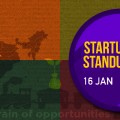For The Sake Of Clarity In India, we Should Perhaps Categorize Startups Into 3 Sub-Categories

SMEs – have no interest to scale, but operationally profitable.
# 1. Startups
Any company that has potential to scale, and is looking at organizing an unorganized sector or a large market with the use of some technology. The way to recognize these companies would be their limited vision, but also to use commoditized technology to run their services. They are also heavily dependent on offline operations.
Eg. Meru Cabs, Fast Track (the tech being, phone lines, instead of someone having to walk up to a auto or cab stand and hail a cab)
Any company that leverages technology efficiently to achieve scale and improve the experience of the end -user or customer.
Eg. Uber / Ola (the tech being smart phones, maps etc and payment using wallets), Flipkart etc. There is still a component of offline operations with these companies, a crucial one, though perhaps not as intense as “startups”
3. Hi-tech startups
Companies that are in the business of building self-driving cars, electric scooters, or the metros of the future, or advanced robotics or AI. These companies provide the building blocks for technology startups to achieve scale and efficiency. They own technology patents and help the country towards technology independence.
Eg. Mad Street Den, Ather Energy, Freshdesk, Hasura and the likes.
Disclaimer: This is an Vijay Anand ( The Startup Guy, Founder at The Startup Centre) post. The statements, opinions and data contained in these publications are solely those of the contributors and not of TamilEntrepreneur.com











